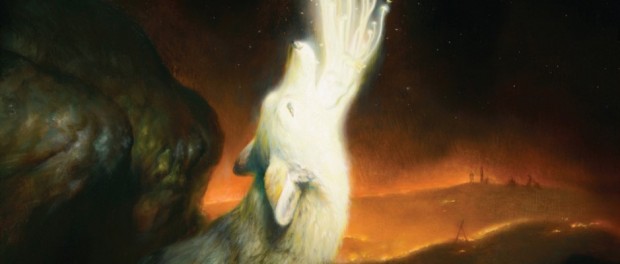Tanya Tagaq – Retribution

Tanya Tagaq has never been at a more crucial point in her career. With her latest avant-garde protest album Retribution, we see an artist that has struggled against the commerciality of the music industry, to the socioeconomic landscape of Canada’s colonial project, and has come through as a symbolic and respected master of her craft.
Born in the Arctic town of Iqaluktuutiaq (ᐃᖃᓗᒃᑑᑦᑎᐊᖅ), renamed by Europeans as Cambridge Bay, and a practitioner of throat singing – a classically Inuit art form meant for duet – since youth, she has been releasing albums for over ten years now, bringing her art from pseudo-obscurity to the spotlight both within Canada and abroad. As an artistic leader of indigenous, environmental and women’s rights, Tagaq has melded these roles into an album that is not only rife with poignant messages about the corporate machine that threatens local traditions, but is equally a stunningly beautiful musical collection.
Retribution is an emotional typhoon; it holds nothing back and scrapes all of the sensations from the psyche, leaving them vulnerable to the message at hand – it is time to fight back. Opener ‘Ajaaja’ leaves you bewildered, a heightening lament whispers knowingly of the storm to come. This unfolds with the sonorous title track, as Tagaq showcases the ability of throat singing to convey a complex range of emotions while remaining superficially undecipherable to the undisciplined ear. This theme continues while evoking sadness, fear and anger, but also desire until the wave breaks unexpectedly on a track in the middle of the album, ‘Centre’.
‘Centre’ features Shad, Canada’s premier alt. rapper, and former host of the influential radio show q, on which Tagaq was his first musical guest. This song displays her chameleonic ability to camouflage her idiosyncratic style to a more mainstream form of song. After this brief foray, we reach ‘Summoning’, a song that removes any minor illusions of a pop-oriented second half, and thrusts the listener back through the vortex of Tagaq’s tortured subconscious. ‘Cold’ lends clarity to the strong environmental message she sends, as the community where she was born faces the bleeding edge of climate change. The denouement of the album brings a sombre close to Tagaq’s message. It is not triumphalist; it is seeking, needing a powerful change that erupts in a final scream at the end of the last original on the album, ‘Sulfur’.
Retribution ends in a peculiar way, with a very “Tagaqian” cover of the song ‘Rape Me’ by grunge band Nirvana. This ending brings an internationalist element to the album previously not explicitly explored, demonstrating the universality of the struggles she painstakingly details and sends a clear missive of misery and anger.
Tanya Tagaq sends a more powerful message on this album than most artists do in a lifetime, and it comes at an opportune time. Through her unique style and incredible talent she uses humanity’s strongest medium to confront its most important crises of environmental and human rights, asking us to act now, before we consume ourselves entirely.
